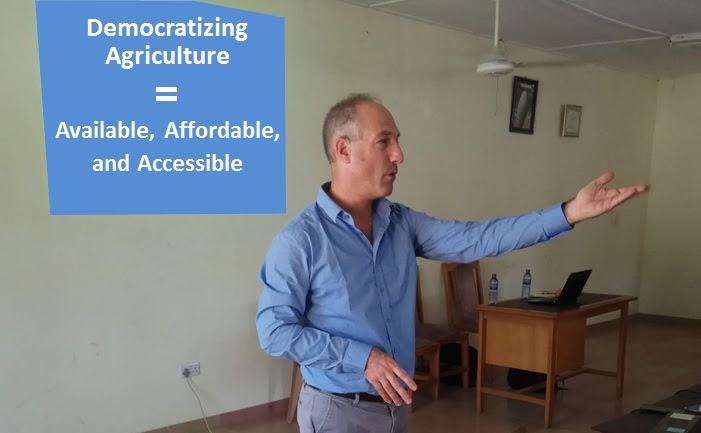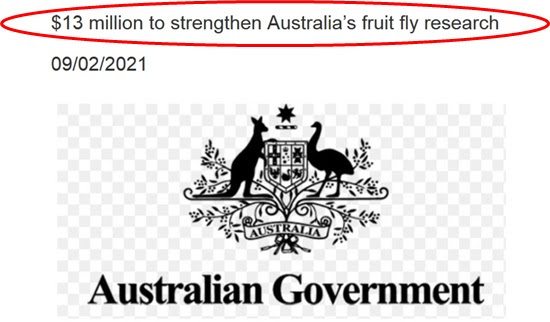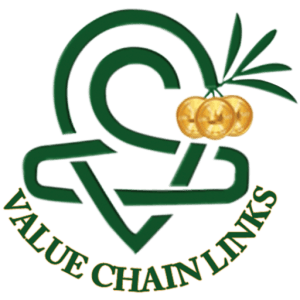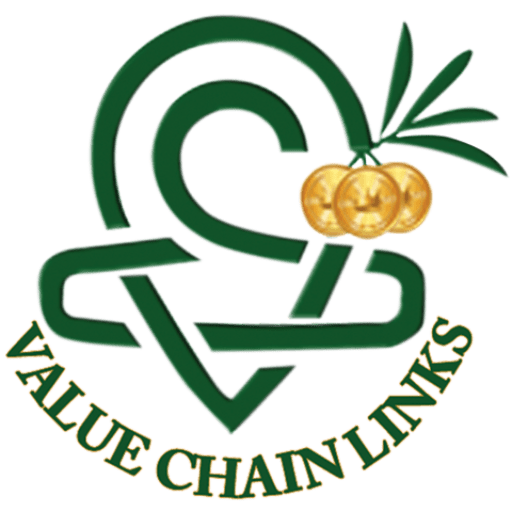WHAT DOES IT MEAN TO ‘DEMOCRATIZE AGRICULTURE,’ AND IS IT DOABLE?

BY DR. NIMROD
The purpose of this article is to stimulate thinking, which will lead to actions and positive changes. Please let me know if, for any reason, you were offended.
REALITY STRIKES ME
I remember 1988 when I was back working in my Kibbutz’s orchards, after long army service. It started with an ambitious effort to transfer from the old crop protection approach, based on preventative sprays, to the IPM (Integrated Pest Management) approach, based on monitoring and treatments (sprays) according to the observed situation.
All went well until we tried to reduce the fruit flies sprays’. What happened next can only be described as “a crop protection disaster.”
Infestation skyrocket, it was hard to distinguish between infested and un-infested fruits, and traders would avoid buying our produce and paid less for what they purchased.
It was a traumatic experience to me and led me to re-evaluate the crop protection domain as a whole and stop seeing it as one-dimensional.
From this day, I stopped seeing crop protection as “a cause for fruit loss.” Instead, I started seeing it in its multi-dimensional shape and as the main barrier for entering premium markets. Hence, it is a barrier to increasing my income and improving my livelihood.
I asked myself whether my experience with fruit flies’ biosecurity issues, which directly impacted my market access, income, and livelihood, was unique, or was it a general phenomenon?
As a fruit grower, I concluded that it would be unrealistic and irresponsible to expect the government to provide the solution I needed. I will have to do it myself.
As a grower who was always very conscious about his expenses, I also marked myself that improving my livelihood is by increasing my income and profit, not through ‘saving,’ as I was already saving. On the contrary, I was ready to expand my expenses if I knew my profit would increase.
Later in the article, I relate to how I view the present Personal, National, and Global biosecurity situation in light of the recent developments brought to us by Biofeed and Green Valley.
COMPATIBILITY (PERSONAL)
Following the previous article, where I discussed the dreadful consequences of the “next year would be better” attitude [>><<], I received from Mr. P the following detailed message;

You should know that much of my time, as the company’s CEO, I invest in studying business opportunities to decide on how and where Biofeed and Green Valley will invest best their limited resources. In that perspective, who should join us in our journey is a crucial dilemma.
When I say ‘who,’ I refer to anyone who influences our planned activity or may be affected by it, including suppliers, customers, partners, and stakeholders.
Choosing the right opportunities is critical since our investment in each project is immense and continual for years.
It is undoubtedly critical for the growers. After all, they need to decide how to step out of their current distressed state to the desired improved and prosperous future.
I found the following simple questions to help sort out the good business opportunities from the improper.
- Does the grower have a problem that Biofeed / Green Valley can fix?
- Does the grower admit he has a problem?
- Does the grower want to fix the problem?
- Is the grower ready to go on a journey with us to fix the problem?
These are precisely the questions I ask myself in the process of screening for the right growers to join Green Valley.
Now let’s read the above message from Mr. P and analyze it based on the above questions.
The Problem– “out of a production of 130,000 tons, less than 20,000 tons are exported. Among these 20,000 tons, between 3,000 and 5,000 tons will be intercepted“.
Mr. P clearly stated the problem of very little export and many interceptions as a problem. This kind of problem is precisely what the Green Valley package is aimed to deal with and solve.
Admit there is a problem – “For _____, each year, the next agricultural season will be the best one than the previous ones. But in reality, it is not. Farmers do not make efforts to protect their production when they have the opportunity to do so“.
Mr. P admits the fruit fly problem, which causes farmers’ production to be unprotected and causing huge losses.
Want to fix – “The solution has been found by Biofeed.”
Mr. P wants to fix the problem based on his experience and knowledge, and he also pin-pointed how to fix it.
Ready to go with us on a journey – “it is now up to the producers to adapt it so that the next season will be better than the previous ones.”
Mr. P is a crop protection expert, not a grower, and hence he cannot answer that question. However, he is unequivocal as to the fact that at last, it is not luck, but in the hands of the producers to make sure “that the next season will be better.”
As can be seen from the words of Mr. P, in the current situation, the state and the mango growers are losing a fortune due to the lack of an effective system approach solution (and not just technological) for fruit flies.
TOO EXPENSIVE (NATIONAL)
Having an infective biosecurity system is very expensive, as you lose yield, markets, income, and traders are not ready to buy from you.
Emerging countries can’t afford the high investments required for having in place effective system approach biosecurity solutions. As a result, they are suffering from unprecedented economic losses that are critically damaging their economies.
On the other hand, Australia, as an example, is an economically developed and capable country with an important and influential country-wide agro-sector. Hence, for decades it develops its biosecurity tools and protects its agro-industry, emphasizing fresh produce export.

Fruit flies are one of Australia’s main agro-industry concerns. Although its growers are far from the prominent global population centers, fresh produce export (including internal trade between Australia’s states) is highly important to the local economy.
The Australian central government secured an additional $13 million investment in fruit fly research, on top of tens of millions already annually invested in fruit fly management. This is a clear indicator of the importance the Australian government sees in having effective biosecurity solutions to continue a successful ago-industry.
Accordingly, ask yourself honestly; how much is my country investing in fruit fly research? How much do I (if you are a grower) invest in fruit fly R&D and management?
Finally, the most crucial question, once I invest in effective fruit fly management, will I gain access to premium value export markets?
Congratulations to the researchers of Australia for continuous successful research for improved fruit fly management.
Now ask yourself how my country and I can improve fruit fly management, based on the resources available to us, which are much, much lower than available to the Australian agro-industry!?
Regardless of the resources, biosecurity demands are the same for all!
Mango grower (and others), are you going to wait for your country to solve your problems? How long will you need to wait before it happens?
DEMOCRATIZING BIOSECURITY (GLOBAL)
How do you ‘Democratize’ something, anything? You do it by making it equally available to all.
It may sound impossible to do, but it is possible and doable, although never easy. Here are two examples:
Computers – Thirty years ago, the mainframe computers cost $2 M and were accessible by few wealthy organizations. Today, PCs are better than the old mainframes but cost only $200 per unit. The computer industry grew bigger as demands increased.
Communication– Only 50 years ago, to talk with someone in another city or overseas, you had to be rich to own a phone. To see him was a whole different question. Today, anyone can pick up their smartphones and talk or see anyone anywhere.
We see that democratization is happening when we introduce a novel business model and technology. Similarly, we can practically ‘democratize’ almost anything.
Interestingly, when we ‘democratize’ something, e.g., communication, we create new opportunities for many people, new solutions, opening access to new markets, use additional channels, and many more jobs that bring economic prosperity!
Now we should ask, how do we ‘democratize’ agriculture?
How can we enable all farmers, regardless of their country, to have equal opportunity, like the Australian farmers, to grow and market to local and export markets high-quality fresh produce?
Fresh produce export is the most challenging task, which is precisely why it should be our goal! If you can Export Fresh Produce, everything else is open before you.
To ‘democratize’ fresh produce exports, we need to overcome many barriers: biosecurity, quality, and logistics. Note that the biosecurity barrier is fundamental and most critical for fresh produce exports.
Here we face critical problems:
- The ability to overcome those barriers is currently limited to few wealthy farmers living in rich countries. However, most farmers live in Africa and Asia (emerging economies) and are restricted from export markets by impermeable biosecurity barriers.
- Emerging economies cannot carry on costly fruit fly research and fruit fly management, as the Australian government and its farmers are conducting.
- Many countries do not have the ability and the tens or hundreds of millions USD to develop and apply successful area-wide integrated system approach management of fruit flies (or other pests).
- Many countries cannot launch a full-size export campaign alongside an orderly, well-organized plan for increasing the quality and the yield per hectare to global top levels.
What can we do to solve that problem and answer the needs of these countries and farmers?
For such countries, I say –
It is okay!
I see you, I hear you, and I understand your problems.
I am aware of the difficulties and limitations that you are facing. I know what you value and what you consider to be important to you. At the same time, I see what Biofeed and Green Valley can provide and need to do to democratize fresh produce exports for your sake.
The Green Valley full Package is our way to democratize the agro-industry and the fresh produce exports.
The Green Valley Package enables any farmer to access export markets at an affordable price, which is a fraction of the current multi-million, not so successful, fruit flies area-wide system approach projects, e.g., SIT.
The Green Valley Package (details in the PS below) is simple, clear, straightforward, and has no hidden agenda –
No need for overhead, no need for tens of years of costly R&D, no need for particular infrastructure, no need for ongoing investments, no need for taking risks, no need of special financials, no need for endless other things, which in reality you were never given, you will never get, and will not bring you the desired results.
The Green Valley Package offers you to get now (not next year) the results you were hoping to get someday.
The Green Valley Package democratize fresh produce export to the level that you could grow anywhere, anytime, at export quality… so you could start exporting to the global lucrative, high-value markets.
Oh, don’t think I forgot this for a second; whatever we do, I keep in mind that our goal is to increase farmers’ income by the end of the day. That is what I said at the beginning of this article, and this is what I meant. We focus on your income because our goal is to increase farmers’ income. It’s simple.
YOU FEEL LIKE I AM ROBBING YOU!
Aka, Mr. P, “The price of a FreeDome (_________) remains expensive for small producers.”
Mr. P, please note that we DO NOT sell the FreeDome units as is!
The way the Green Valley concept is working is through the implementation of Green Valley projects. We apply the FFCTZ protocol in those projects, which uses the FreeDome units to manage the fruit flies without sprays.
Mr. P, allow me to summarize;
IF you consider Green Valley (and FreeDome) only as an alternative to decrease your cost of purchasing the ineffective methyl eugenol traps, you are right; Green Valley is more costly. If all you care about is the price and you don’t care about the income and profit, then Green Valley should not be your first choice.
However, maybe, you consider the Green Valley Package as your way to increasing your income and profit per hectare by improving the quality and the yield, open new market channels including exports, getting over the biosecurity barrier, etc. If that is the case, then Green Valley is your “once in a lifetime dream investment opportunity.”
Mr. P, for how much do you evaluate the benefits Green Valley can bring to your country? ($ Millions / 10s$ millions / 100s$ millions?)
How much your country and its farmers can profit from the ability to export from anywhere and anytime, including during the rainy season, without worrying about fruit fly biosecurity issues? Another way to phrase that question is by asking the opposite, how much you lose today and every year that you don’t export? ($ Millions / 10s $ millions / 100s $ millions?)
How much is it worth for your country NOT having ongoing investments in R&D? ($ Millions / 10s $ millions / 100s $ millions?)
How high are your country’s financial gap and its farmers between “open fresh export markets” to “export ban”?
I intend to work, assist and help those countries and farmers to positively answer YES for each of the questions I presented earlier in this article.
It seems that there is no way we can answer the growing demand for Green Valley services. It means that in the near future, we can work with only a few farms. We will prefer working with those who have the highest motivation and can set the best example and later serve as a center of excellence and education for the rest of the farmers.
CLOSING A CIRCLE
This journey began when I told myself that MARKETING is the most important thing for me as a grower.
I began looking at biosecurity hazards, e.g., fruit flies and chemical residues, as MARKETING issues, which I need to address to improve my livelihood.
Knowing “the governmental system” and available technologies (e.g., SIT, applied in vast and expensive projects), it became clear that a solution to my problems will not come from the state level.
I am not a quitter, so I started working on bringing a proper solution that will enable me to take complete control of my future.
Over 30 years later, the circle is closed with the development of the Green Valley Package.
Finally, growers can take complete control of their future by solving their biosecurity hazards (starting with fruit flies) without the need to rely on the state to establish costly infrastructure and assign significant budgets and subsidies.
Green Valley Package democratizes fresh produce exports by removing the barriers that were considered “unremoved” until now. Hence, we are paving new ways to connect growers and consumers better and having it available, affordable, and accessible to all growers, including smallholders, with which we already work.
I am proud and feel lucky to lead Biofeed and Green Valley in light of such a high Vision, turning into reality as we speak.
Please note, we are currently in the running stages of Green Valley. To not compromise on service quality and results, this year’s participation is limited to a few (3-4 farms/organizations, depending on size) in 2 countries only. We are now in the final stages of selecting the partners for 2021. Good luck to everyone.

